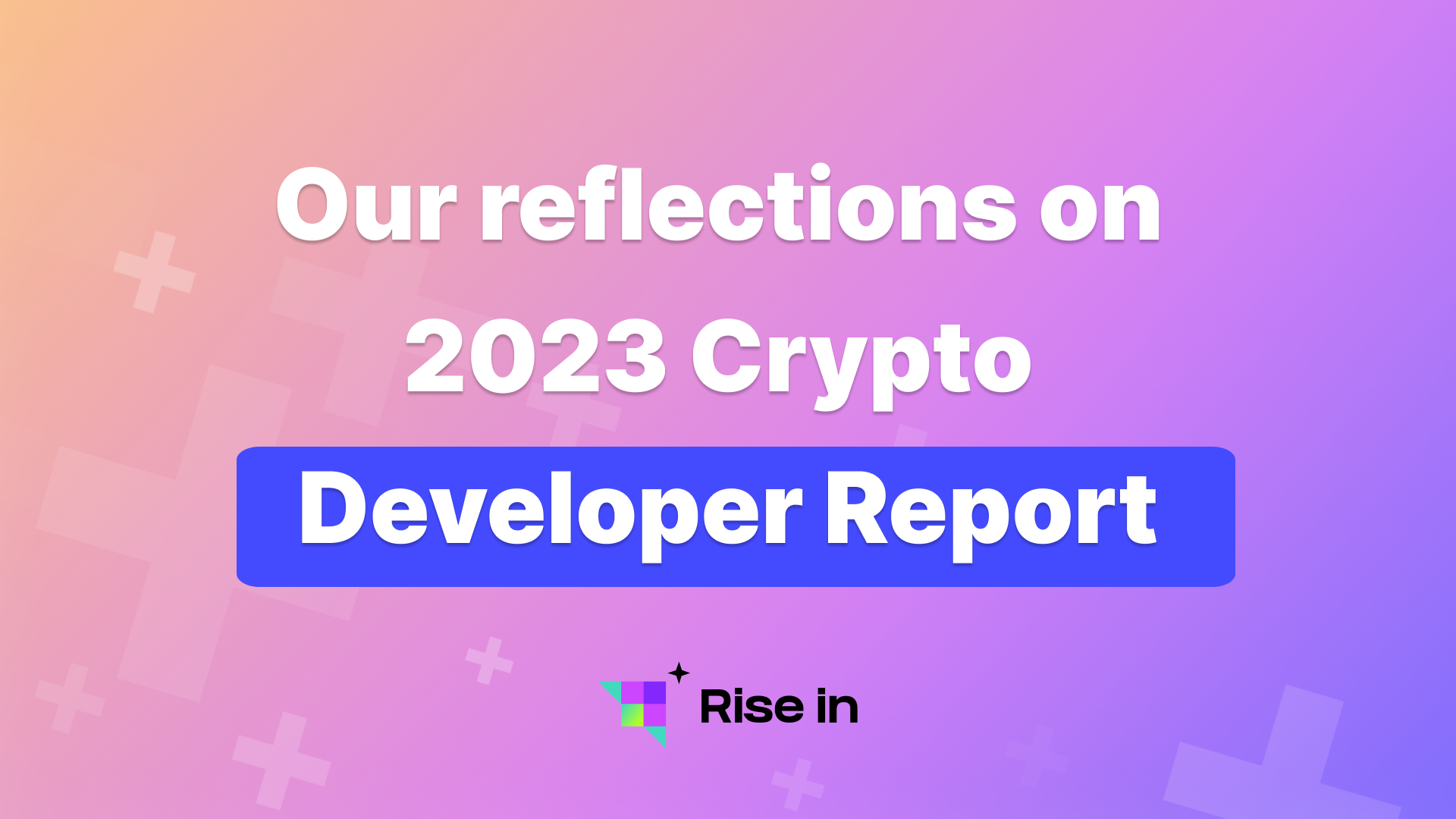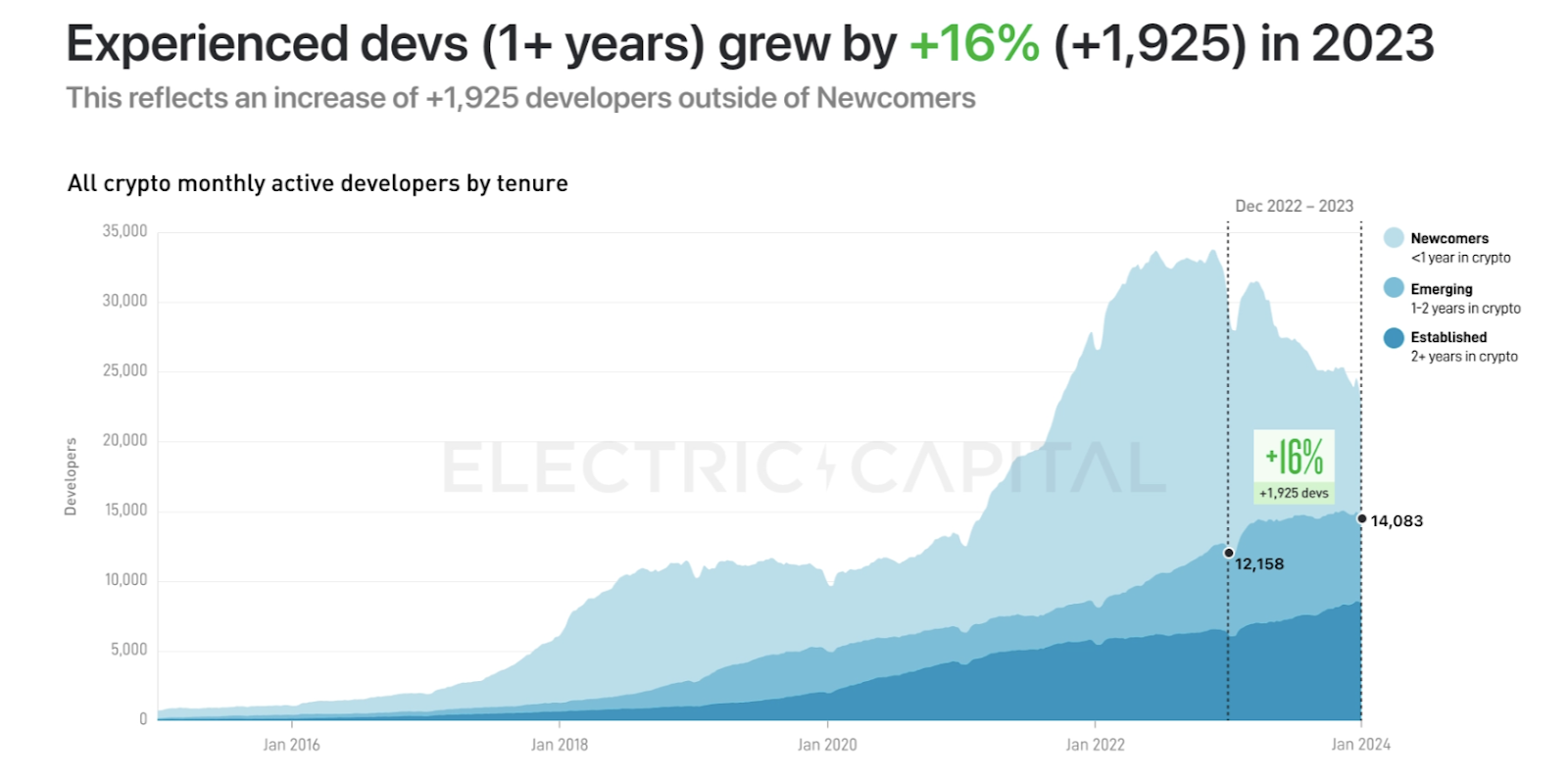GY
Gülcan Yayla
Co-founder, CEO
October 17, 2025
Rise In’s Reflections on 2023 Crypto Developer Report
2023 Crypto Developer Report has just been published. It has a lot of exciting news. But there are also many lessons to be learned - especially about the newcomers.

2023 Crypto Developer Report has just been published. It has a lot of exciting news. Experienced developer (1+ yr of experience) number improved %16 annualized in 2023. We’re also happy to see the increasing share of developers from many different regions around the world. South Asia, Latin America, Eastern Europe, Western Africa, and Southern Europe collectively grew developer share by 20%+ since 2018.
But there are also many lessons to be learned - especially about the newcomers.
Why do we care about newcomers?
The report mentions that established developers have grown 52% per year for the past 5 years and increased from 1,000 developers in 2018 to about 8,000 developers in 2023. In that timeframe, about 230,000 newcomer developers contributed to projects.
If we all did a slightly better job in understanding and retaining newcomer developers, we could easily have had 15,000-20,000 established developers in the ecosystem and would have read an even more exciting Crypto Developer Report.
At Rise In, our main focus group is web2 developers who are just taking their first step into web3. In other words, we focus on 99% of the 25 million developers that haven’t joined web3 space yet. That’s why we also feel a connection and have direct experience on the subject.
That’s why, we decided to focus on the newcomer numbers of the report:
98% of newcomers who joined web3 in 2022 left in 2023
One part stood out to us. According to the report, in 2022, about 90,000 new developers joined the web3 developer ecosystem. However, the net growth in the 1+ years of experienced developer ecosystem a year later was about 2,000.

👆In 2022, there were 90,000+ newcomers

👆If these 90,000 developers stayed in web3, they’d have been “experienced devs” with 1+ years of experience in 2023. But these 1+ years of experienced devs increased by less than 2,000.
That’s almost 98% net churn. And we are not talking about a student that once started a web3 tutorial. We are talking about “newcomers” who have substantially contributed to a real crypto project in 2022.
How come only a fraction of those competent and interested developers ended up becoming a monthly active crypto developer in 2023?
We were both surprised and not surprised. We were surprised because we knew there was significant churn, but we didn’t expect the numbers to be as high as 98%.
In 2023, more than 50,000 developers started learning web3 development on our platform, Rise In. We partnered with many leading web3 protocols to bring free training opportunities to developers around the world.
Newcomers struggle with staying engaged with web3 because employment is the ultimate goal of many of these developers especially in developing countries
We were not surprised to see that number because we saw hundreds of people who become contributors to web3 projects struggle to figure out how to stay engaged with their web3 ecosystems.
We mostly work with developers in regions like Turkey, India, Nigeria, Kenya, Pakistan. When we have conversations with developers accepted in our programs, the most common question we are asked is whether they can get jobs in web3. Employment is the ultimate goal of many of these developers.
Often, web3 and crypto adoption in developing countries is high, because there is some economic instability, often in the form of high inflation. This also comes hand in hand with youth unemployment. People who join the crypto developer ecosystem expect to find solutions to their long-term employment. These concerns may have been irrelevant to early crypto developers, but as the report shows, the growth of the developer ecosystem is coming from all around the world now, where such concerns are very relevant to newcomers.
The current engagement mechanisms like bounties and grants in web3 are foreign to many developers
Today, when a competent developer invests their time and manage to become productive in web3 enough to contribute to open-source projects, they are faced with a confusing road ahead. They are asked to compete in hackathons. They are asked to come up with a project and build their own startups. They are asked to apply for grants (Note: Many developers joining our web3 programs for the first time haven’t even heard of “grants” or “bounties” before. We explain the concept to our students most of the time.) At the same time, they can’t find people they can relate to who know how to navigate this maze.
Do hackathons incentivize “serial hackathon competitors” rather than motivating newcomers to stay? More than half of the projects come from only %5 of the participants
Hackathons are a good way to get a lot of people exposed to new technology, but they are hardly a reliable and meaningful way to become a long-term builder.
When we analyzed a few of the major hackathon platforms, we found that most of the projects come from a few groups. In two hackathon platforms, we found that 60% of all the projects come from only %5 of the participants, who on average submitted 15-25 projects in different hackathons. These platforms incentivize people to become serial hackathon competitors who recycle their existing project concepts multiple times without actually even turning them into actual products.
Building a startup / product is difficult in countries with limited startup culture
If developers aren’t satisfied with the hackathon cycle, they are asked to come up with a project and pursue grant or investment opportunities. However, building a successful project is really hard. Building a sustainable startup is harder. It is even harder to do when you are a newcomer to an ecosystem.
It is even much harder to do this if you are living in countries where there is not a big startup culture. In places like Turkey, the majority of young people grow up being concerned about finding employment. “Mark Zuckerberg started Facebook while in college” is something we hear as a response. There are probably only a handful of college drop-outs in places like Turkey who have built unicorn startups. Betting on one-in-a-million possibilities is not really giving people a realistic roadmap.
Even when a developer has a project, grant programs have processes that feel very bureaucratic. A developer is not only asked to be an entrepreneur but also a competent grant writer. Most developers I know don’t happen to be great at writing grants.
Local communities with local languages are very important
When people are introduced to and are intrigued by a web3 ecosystem, they expect at least a long-term commitment. They want to have people around them who they can relate with and who they can get some guidance from. They need a long-term community of like-minded people full of success stories. These communities need continuous education programs to bring in fresh people while they also need continuous support from the broader web3 ecosystem.
For many people web3 starts off as an exciting idea. If we want it to become a real career path, we need to make the idea of web3 become real for newcomers. Newcomers need to see other web3 developers in real life. They need to meet people who have been in an ecosystem for multiple years. They need to exchange stories of struggles and triumphs. They need to find friends or collaborators who they can work on projects with.
One of the ecosystems that does a great job of addressing these concerns is Solana. Solana and Rise In partnered together to build Superteam Turkey where we offer long-term programs to train new Solana developers while also offering bounties, grants, hackathons, and employment opportunities to our community.
Internships as an experimentation instead of bounties / grants
We also started experimenting with building internship programs, instead of grants. Many developers are very excited to have a structured, long-term engagement with an ecosystem while also earning enough money to continue upskilling themselves, gain more web3-related job experience, and something they can add to their resume that would help them get their next job in any tech career.
Last words
We need more ideas, more open-minded experiments, and long-term commitment from all players in the ecosystem. At Rise In, we are constantly trying new onboarding models that better align with the needs of newcomers, while also heavily investing in on-the-ground, local community engagement.
If you feel connected to these issues and want to get involved in the new reports we’ll share using the data we learn from our 50k+ developer students, email me at gulcan@risein.com.
ReportsDeveloper InsightsWeb3